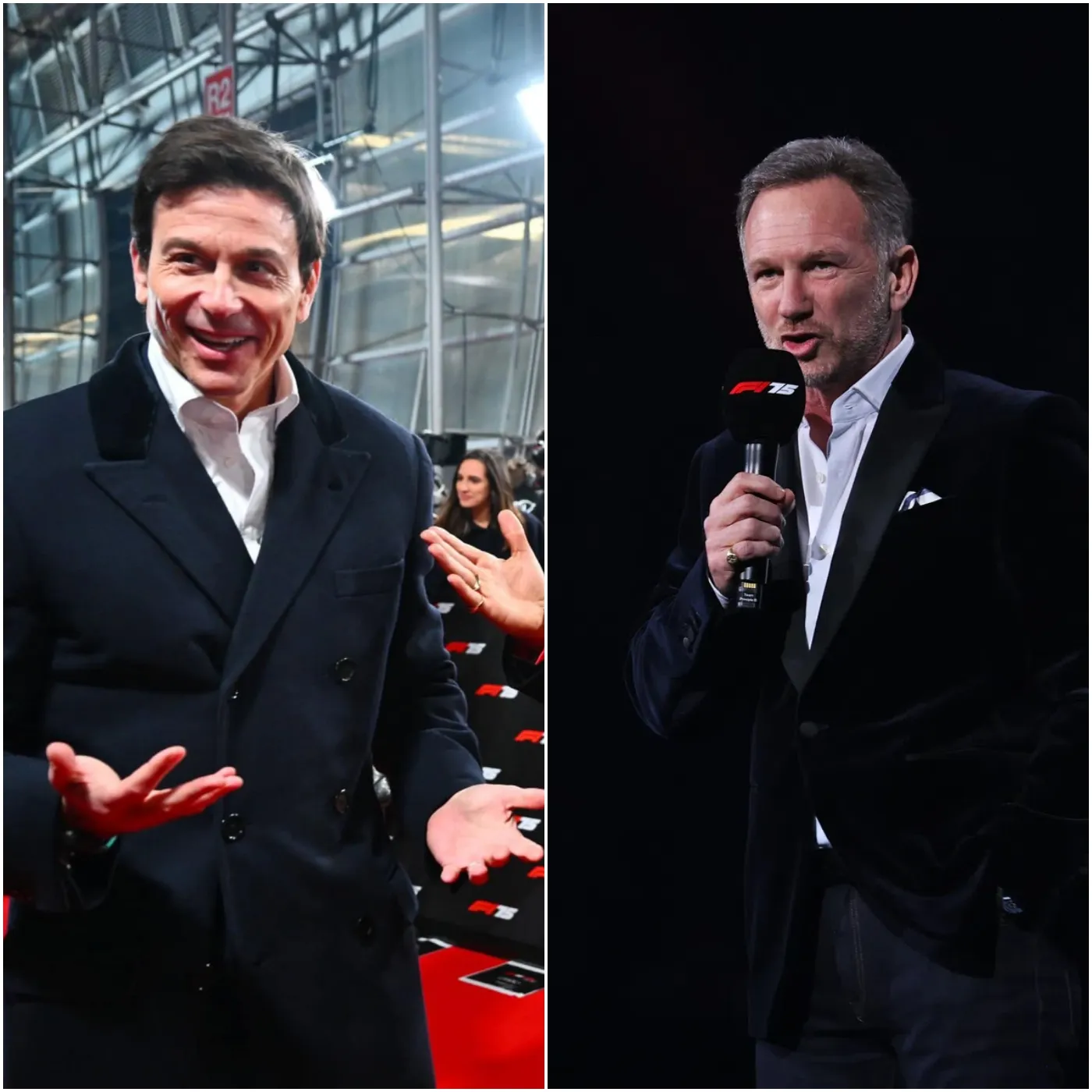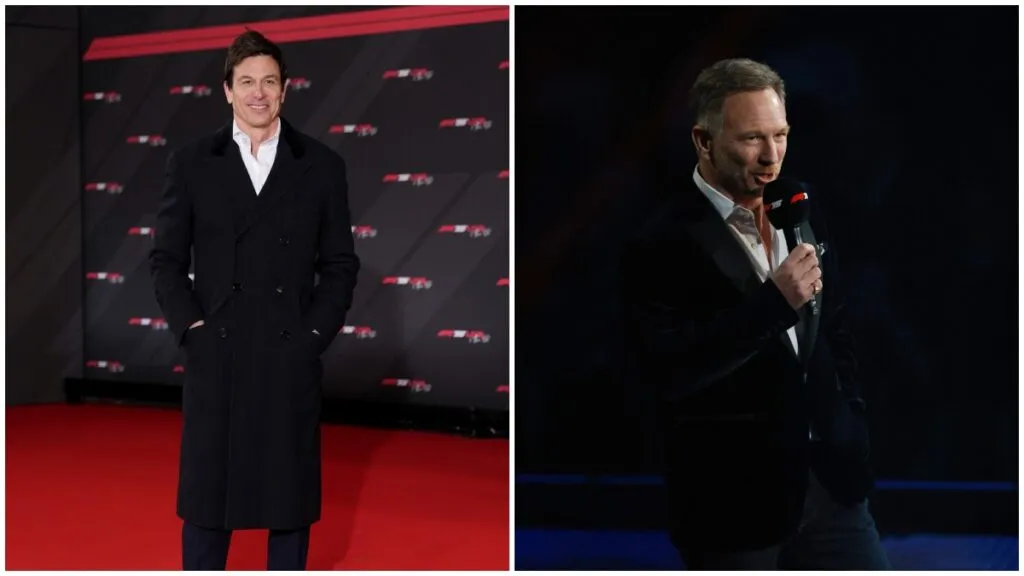

Toto Wolff sobre los abucheos a Red Bull
The FIA is reportedly planning to address the booing directed at Max Verstappen and Christian Horner during the F1 75 event at the upcoming World Motorsport Council meeting. The governing body had previously released a statement expressing disappointment over the crowd’s behavior at the O2 Arena. Now, it appears they want to take the discussion further, raising serious questions about whether F1 is becoming too sanitized.
Verstappen and Horner were booed from the moment they appeared on stage, and the Red Bull team principal faced further negative reactions when addressing the audience. But was this really unexpected? Red Bull has been at the center of controversy for years, with their dominance and off-track dramas making them both admired and despised.
Interestingly, the crowd’s discontent was not limited to Red Bull representatives. Presenter Laura Winter was also met with boos when praising the FIA’s contributions to motorsport over the past 75 years. If anything, this suggests that the frustration goes beyond Verstappen and Horner—it’s about the FIA itself.
Verstappen’s Stance: The Dutch Lion Bites Back
Verstappen, who already seemed unenthusiastic about the F1 75 Live event, is now reportedly unwilling to participate in future editions held in England. And honestly, who can blame him? If a driver is openly disrespected by fans, why should he entertain them? His father, Jos Verstappen, confirmed Max’s stance, stating that his son will skip the event should it be held again in England.
While some might view this as Verstappen being thin-skinned, others argue that he has every right to avoid an environment that feels hostile. However, it does raise an interesting debate: Should top athletes be expected to face the music, no matter how brutal, or do they deserve respect regardless of their on-track actions?

Toto Wolff’s Take: Reality Check or PR Move?
Mercedes team boss Toto Wolff doesn’t believe Verstappen was booed at all. Speaking at the event, he argued that there was plenty of cheering for the reigning World Champion, and that the real target was Christian Horner. But is this just Wolff playing mind games? After all, Red Bull has been his team’s biggest rival in recent years.
Horner, according to Wolff and Sky F1 reporter Craig Slater, was indeed the focus of the crowd’s displeasure. But Wolff brushed off the controversy, insisting that the event was a success despite the backlash.
“And we shouldn’t talk an event down that was mega just because one single individual, rightly or wrongly, was booed when he spoke,” Wolff stated. “It was a great event. I mean, the spectators there were great. The presentation of the cars was good. And it sets a new format for the years to come and that is the positive we need to take from that.”
Of course, Wolff’s take comes with its own bit of humor. When jokingly asked if he was one of the people booing Horner, he quipped: “No, I wasn’t booing. There were 15,000 people that did that! It wasn’t necessary that I did.”
The Bigger Issue: Is F1 Losing Its Edge?
The bigger question in all of this is whether F1 is becoming too soft. Motorsport has always been a battleground of egos, rivalries, and fan passion. The idea that booing should be discussed at the World Motorsport Council feels like an overreach to many. Shouldn’t F1 embrace the drama rather than try to police fan reactions?
Yes, sportsmanship is important, but so is raw emotion. Verstappen, Lewis Hamilton, Sebastian Vettel—every great driver has faced boos at some point in their career. It comes with the territory. Trying to control crowd reactions sets a dangerous precedent. If the FIA truly wants to address fan behavior, they should start by making decisions that feel fair and transparent rather than attempting to silence passionate supporters.
The FIA’s Changing Role: A Governing Body or a Morality Police?
There was a time when the FIA primarily focused on enforcing technical regulations and ensuring driver safety. Today, it seems they have also taken on the role of moral arbiters, attempting to manage not just the cars and tracks but also public opinion. This shift raises an important question: Should an organization governing a high-intensity, competitive sport be overly concerned about crowd behavior?
Let’s not forget that Formula 1 is not a sport of restraint. The competition is ruthless, the rivalries intense, and the fans equally passionate. Expecting civility at all times is unrealistic. In a sport where drivers regularly push each other to the limit, why should we expect the fans to be any different?
Verstappen vs. the English Fans: A New Chapter in F1’s Fiercest Rivalry
Let’s not ignore the elephant in the room—Max Verstappen has never been particularly loved in the UK. The bitter 2021 title fight against Lewis Hamilton left scars that still haven’t healed for many British fans. Every Verstappen victory reminds them of that controversial Abu Dhabi finale, and the boos are just another way of venting their lingering frustration.
But Verstappen isn’t a driver who craves universal admiration. If anything, he thrives on hostility. His entire career has been built on proving doubters wrong, from his teenage debut in F1 to his relentless dominance today. The more he gets booed, the more he seems to enjoy proving why he’s the best driver on the grid.

The Horner Factor: Why Is He a Target?
Christian Horner’s presence in this controversy is equally fascinating. Unlike Verstappen, who is divisive purely because of his on-track success, Horner has built a reputation as F1’s ultimate political player. His clashes with Wolff, his relentless defense of Red Bull’s dominance, and his outspoken personality make him a magnet for criticism.
But here’s the thing—Horner isn’t doing anything unusual. F1 team principals have always played the political game. Whether it was Ron Dennis, Flavio Briatore, or even Jean Todt, every successful team boss has had to navigate controversies, bend rules to their advantage, and engage in psychological battles. If anything, Horner is just continuing F1’s long tradition of mind games.
What Happens Next?
With pre-season testing kicking off in Bahrain on February 26, all eyes will be on how this story develops. Will the FIA take further action? Will Verstappen’s refusal to attend English events create further division? And most importantly, will fans stop booing? (Spoiler: probably not.)
One thing is for sure—this controversy isn’t going away anytime soon. Whether you love or hate Verstappen and Horner, they’re at the center of F1’s ongoing drama, and as any good motorsport fan knows, the drama is half the fun.
At the end of the day, this isn’t about booing. It’s about what kind of sport we want F1 to be—raw and unapologetic, or carefully curated and sanitized? And as much as the FIA may try to regulate fan behavior, the reality is that in a sport fueled by passion, controversy will always have a front-row seat.


















